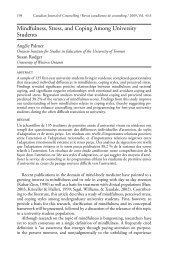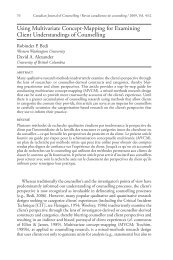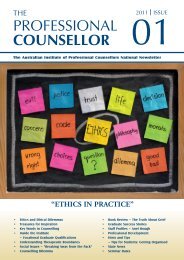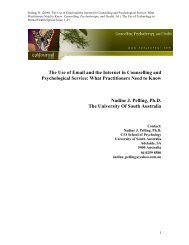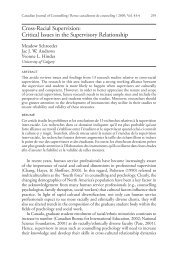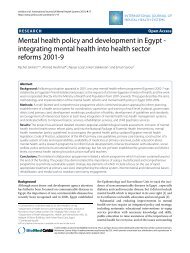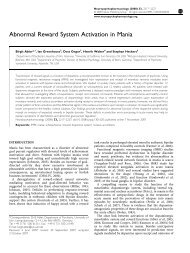PROFESSIONAL COUNSELLOR - Mental Health Academy
PROFESSIONAL COUNSELLOR - Mental Health Academy
PROFESSIONAL COUNSELLOR - Mental Health Academy
- No tags were found...
Create successful ePaper yourself
Turn your PDF publications into a flip-book with our unique Google optimized e-Paper software.
THE <strong>PROFESSIONAL</strong> <strong>COUNSELLOR</strong>03 2007Your decisions are still going to worry you, andupset your teen at times, but when you make aconscious effort to allow increased levels of freedomand responsibility, while also fairly measuring howwell your teen handles the changes, you should findthat the struggles with your teenager should begin todiminish.Helping Your Child Prepare for ChangeWhile most kids look forward to summer vacation,it can also be a time of stress and anxiety. As the setschedules and known activities of the school year end,children face a summerthat may be full ofunknowns. It’s also a timewhen major changes aremost likely to occur.Changes may be small,like visiting relatives,joining a new soccer team,or going to a new camp,or they can be major, likemoving to a new home orentering a new school atsummer’s end. For manychildren, new and differentthings or activities can besources of stress andanxiety.Change is inevitable, ofcourse, and a necessarylife skill is learning tohandle change successfully.“As parents,there arethings we cando to reducethis stress, andto prepare ourchildren tobetter handlefuture changesandtransitions.”But many children are“change-sensitive”, becoming overly nervous andanxious when confronted with something different.As parents, however, there are things we can do toreduce this stress, and to prepare our children tobetter handle future changes and transitions.• Discuss changes. Children quickly pick up clueswhen changes are coming and their imaginationsare always active. Discuss what is really going tohappen. Answering questions can help make thetransition more understandable and less anxietyproducing.• Help your child visualize the change. If it’s a moveto a new house, share pictures and maps, or makea visit, to help make it more concrete. Driving bythat new soccer field, walking around the newschool or talking with a counselor from thatupcoming camp can help remove some of thestress.• Provide adequate preparation time. Don’t surpriseyour child with a major change. That only adds tothe stress and creates problems that can be longlasting.Pick a reasonable amount of time before abig change to start discussing what is about tohappen.• Offer reassurance. Let your child know youunderstand change can be hard, but that you’rethere with your support and love. Talk about pastchanges and how well he or she handled them.Express confidence that this new change is a goodthing and that he or she will handle it well.It’s natural to feel some anxiety about new things,especially major changes. But with a little preparation,understanding and support, you can help your child toaccept changes without feeling unhealthy levels ofstress and anxiety.© American Counseling Association / “TheCounselling Corner”The Counseling Corner is provided as a publicservice by the American Counseling Association, thenation’s largest organization of counselingprofessionals. Learn more about the counselingprofession at the ACA web site, www.counseling.org.ASSIGNMENTS HINTS AND TIPSReading all parts of your workbook carefullyIn their enthusiasm to get their work in for marking,students sometimes misread instructions or leave outanswering a question altogether. As every question ina workbook must be completed in order to achievecompetency this will inevitably result in a delay in thefinal marking of the unit.It is important to read each question carefully tomake sure that you understand exactly what it isasking you to do; if you have difficulty understandingjust what is required in a question, AIPC EducationAdvisers can help. They can be contacted any timeby email, or on the Study Assistance Line number1300 139 239. It is also worth checking theKnowledge Base as other students may have haddifficulty with the same question and there will be areference to it there.In some units you will be asked to submit an itemseparately, such as a case study or an example of aform; students sometimes forget to include these itemswhen they send in their workbooks.A good habit is to check back over every questionas you complete each section and then again whenyou have completed the whole book. If somethingseparate needs to be sent in, make a note of it so thatyou will remember to include it.It is very frustrating to have the marking held up ifeverything you have done is correct, but just onequestion, or a part of it, has been omitted – so makesure it doesn’t happen to you!11



